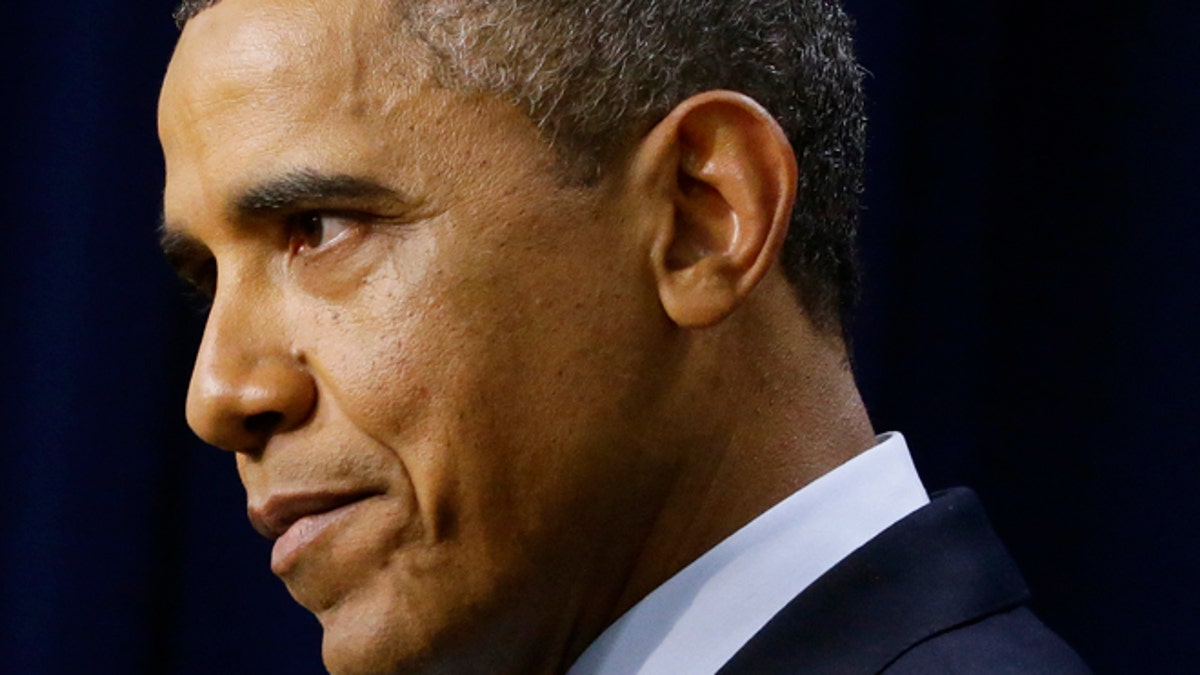
President Barack Obama pauses as he speaks about the fiscal cliff, Monday, Dec. 31, 2012, in the South Court Auditorium at the White House in Washington. The president said it appears that an agreement to avoid the fiscal cliff is "in sight," but says it's not yet complete and work continues. (AP Photo/Charles Dharapak) (AP)
Actors Bradley Cooper and Glenn Close are among those gathering Monday at the White House for a conference on mental health, organized as part of President Barack Obama's response to last year's shooting massacre at a Connecticut elementary school.
Although the one-day conference was a response to gun violence, its agenda is much broader and includes discussion of insurance coverage for mental health care and substance abuse, recognizing the signs of mental illness in young people and improved access to services for veterans. The overall goal is reducing the stigma of mental health problems and encouraging those who are struggling to get help.
Obama plans to deliver opening remarks in the East Room and Vice President Joe Biden, the president's point man on gun violence, is scheduled to close it from the Eisenhower Executive Office Building. Around 150 invited attendees include mental health advocates and patients, educators, health care providers, faith leaders, lawmakers and local government officials from across the country.
Cooper and Close bring their advocacy and a celebrity buzz to the event.
Cooper has been promoting mental health awareness since his Oscar-nominated leading role as a man with bipolar disorder in last year's "Silver Linings Playbook," and plans to help Biden and Veterans Affairs Secretary Eric Shinseki close the conference.
Close's experience has been more personal. Her sister, Jessie, has bipolar disorder and Jessie's son, Calen, has schizoaffective disorder. In 2009, Close's family battles led her to help start a non-profit called Bring Change 2 Mind, which produces public service announcements to fight the stigma and discrimination associated with mental illness. She is listed on a panel discussion on how to address negative attitudes about mental illness.
The conference comes after Obama's defeat on gun control legislation. Unable to get Congress to approve background checks, an assault weapons ban and other limits on firearms, the president has vowed to do what he can through executive action.
Among 23 executive orders Obama signed in response to the shooting at Connecticut's Sandy Hook Elementary School that killed 26 was a directive that Health and Human Services Secretary Kathleen Sebelius and Education Secretary Arne Duncan launch a national dialogue on mental health. The conference is part of that, with Sebelius hosting the panel on addressing negative attitudes and Duncan moderating a session on successful mental health outreach efforts.
There's been little publicly revealed about the mental health of Sandy Hook shooter Adam Lanza, although it's been documented that other gunmen involved in mass shootings suffered from mental illness. Federal law bans certain mentally ill people from purchasing firearms, but the background check system is woefully incomplete and Obama is trying to get more mental health records included.
In announcing the conference, the White House stressed that the vast majority of people with mental health conditions are not violent and are more likely to be victims than perpetrators of crimes. But the need to improve the country's mental health care system is something all sides of the gun debate have advocated, including the National Rifle Association.
"That is something substantive that Congress and the president could do right now that would actually help prevent future tragedies, unlike the gun control proposals that the president unsuccessfully tried to push through Congress," said NRA spokesman Andrew Arulanandam
The White House said Obama plans to announce that the Department of Veterans Affairs will conduct mental health summits nationwide to increase awareness of VA programs and link veterans and their families with community resources to support their needs. The conference also plans to tout improvements in mental health coverage under Obama's health care law, including a ban beginning next year against denying coverage to those who are mentally ill.
The White House also plans to focus on commitments being made in the private sector to increase understanding and awareness, including a campaign by the National Association of Broadcasters through television and radio ads and social media. Several organizations that work with young people also are planning to make new commitments, including high school principals holding mental health assemblies, to YMCA instructing staff and camp counselors to recognize the signs of mental health issues in kids, to religious leaders launching conversations on the issue.
